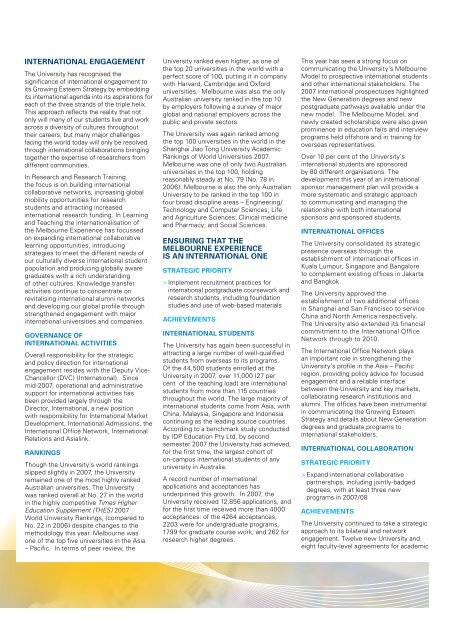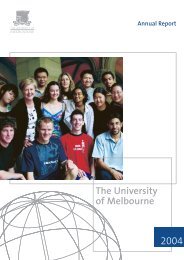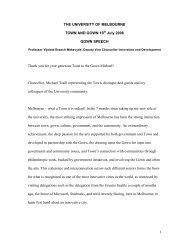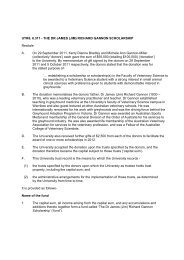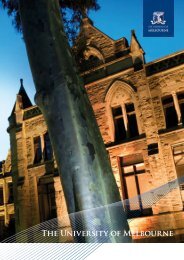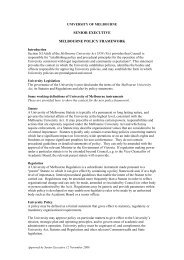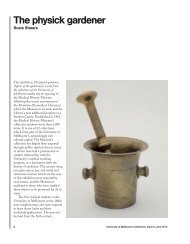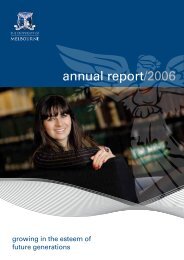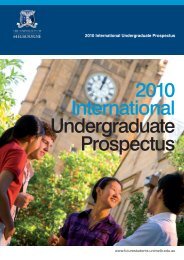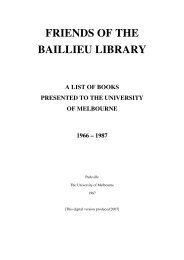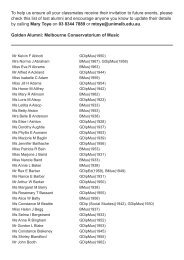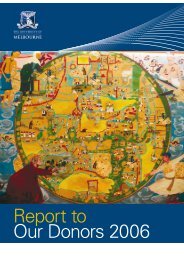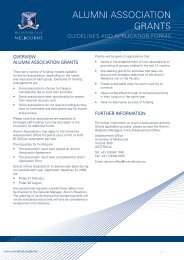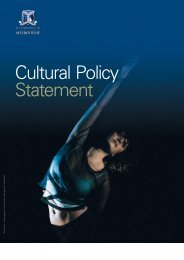2007 Annual report (PDF 8.1 Mb) - University of Melbourne
2007 Annual report (PDF 8.1 Mb) - University of Melbourne
2007 Annual report (PDF 8.1 Mb) - University of Melbourne
You also want an ePaper? Increase the reach of your titles
YUMPU automatically turns print PDFs into web optimized ePapers that Google loves.
International Engagement<br />
The <strong>University</strong> has recognised the<br />
significance <strong>of</strong> international engagement to<br />
its Growing Esteem Strategy by embedding<br />
its international agenda into its aspirations for<br />
each <strong>of</strong> the three strands <strong>of</strong> the triple helix.<br />
This approach reflects the reality that not<br />
only will many <strong>of</strong> our students live and work<br />
across a diversity <strong>of</strong> cultures throughout<br />
their careers, but many major challenges<br />
facing the world today will only be resolved<br />
through international collaborations bringing<br />
together the expertise <strong>of</strong> researchers from<br />
different communities.<br />
In Research and Research Training<br />
the focus is on building international<br />
collaborative networks, increasing global<br />
mobility opportunities for research<br />
students and attracting increased<br />
international research funding. In Learning<br />
and Teaching the internationalisation <strong>of</strong><br />
the <strong>Melbourne</strong> Experience has focussed<br />
on expanding international collaborative<br />
learning opportunities, introducing<br />
strategies to meet the different needs <strong>of</strong><br />
our culturally diverse international student<br />
population and producing globally aware<br />
graduates with a rich understanding<br />
<strong>of</strong> other cultures. Knowledge transfer<br />
activities continue to concentrate on<br />
revitalising international alumni networks<br />
and developing our global pr<strong>of</strong>ile through<br />
strengthened engagement with major<br />
international universities and companies.<br />
Governance <strong>of</strong><br />
International Activities<br />
Overall responsibility for the strategic<br />
and policy direction for international<br />
engagement resides with the Deputy Vice-<br />
Chancellor (DVC) (International). Since<br />
mid-<strong>2007</strong>, operational and administrative<br />
support for international activities has<br />
been provided largely through the<br />
Director, International, a new position<br />
with responsibility for International Market<br />
Development, International Admissions, the<br />
International Office Network, International<br />
Relations and Asialink.<br />
Rankings<br />
Though the <strong>University</strong>’s world rankings<br />
slipped slightly in <strong>2007</strong>, the <strong>University</strong><br />
remained one <strong>of</strong> the most highly ranked<br />
Australian universities. The <strong>University</strong><br />
was ranked overall at No. 27 in the world<br />
in the highly competitive Times Higher<br />
Education Supplement (THES) <strong>2007</strong><br />
World <strong>University</strong> Rankings, (compared to<br />
No. 22 in 2006) despite changes to the<br />
methodology this year. <strong>Melbourne</strong> was<br />
one <strong>of</strong> the top five universities in the Asia<br />
– Pacific. In terms <strong>of</strong> peer review, the<br />
<strong>University</strong> ranked even higher, as one <strong>of</strong><br />
the top 20 universities in the world with a<br />
perfect score <strong>of</strong> 100, putting it in company<br />
with Harvard, Cambridge and Oxford<br />
universities. <strong>Melbourne</strong> was also the only<br />
Australian university ranked in the top 10<br />
by employers following a survey <strong>of</strong> major<br />
global and national employers across the<br />
public and private sectors.<br />
The <strong>University</strong> was again ranked among<br />
the top 100 universities in the world in the<br />
Shanghai Jiao Tong <strong>University</strong> Academic<br />
Rankings <strong>of</strong> World Universities <strong>2007</strong>.<br />
<strong>Melbourne</strong> was one <strong>of</strong> only two Australian<br />
universities in the top 100, holding<br />
reasonably steady at No. 79 (No. 78 in<br />
2006). <strong>Melbourne</strong> is also the only Australian<br />
<strong>University</strong> to be ranked in the top 100 in<br />
four broad discipline areas – Engineering/<br />
Technology and Computer Sciences; Life<br />
and Agriculture Sciences; Clinical medicine<br />
and Pharmacy; and Social Sciences.<br />
Ensuring that the<br />
<strong>Melbourne</strong> Experience<br />
is an International One<br />
Strategic Priority<br />
> Implement recruitment practices for<br />
international postgraduate coursework and<br />
research students, including foundation<br />
studies and use <strong>of</strong> web-based materials<br />
AChieVEMENTS<br />
International Students<br />
The <strong>University</strong> has again been successful in<br />
attracting a large number <strong>of</strong> well-qualified<br />
students from overseas to its programs.<br />
Of the 44,500 students enrolled at the<br />
<strong>University</strong> in <strong>2007</strong>, over 11,000 (27 per<br />
cent <strong>of</strong> the teaching load) are international<br />
students from more than 115 countries<br />
throughout the world. The large majority <strong>of</strong><br />
international students come from Asia, with<br />
China, Malaysia, Singapore and Indonesia<br />
continuing as the leading source countries.<br />
According to a benchmark study conducted<br />
by IDP Education Pty Ltd, by second<br />
semester <strong>2007</strong> the <strong>University</strong> had achieved,<br />
for the first time, the largest cohort <strong>of</strong><br />
on-campus international students <strong>of</strong> any<br />
university in Australia.<br />
A record number <strong>of</strong> international<br />
applications and acceptances has<br />
underpinned this growth. In <strong>2007</strong>, the<br />
<strong>University</strong> received 12,856 applications, and<br />
for the first time received more than 4000<br />
acceptances: <strong>of</strong> the 4264 acceptances,<br />
2203 were for undergraduate programs,<br />
1799 for graduate course work, and 262 for<br />
research higher degrees.<br />
This year has seen a strong focus on<br />
communicating the <strong>University</strong>’s <strong>Melbourne</strong><br />
Model to prospective international students<br />
and other international stakeholders. The<br />
<strong>2007</strong> international prospectuses highlighted<br />
the New Generation degrees and new<br />
postgraduate pathways available under the<br />
new model. The <strong>Melbourne</strong> Model, and<br />
newly created scholarships were also given<br />
prominence in education fairs and interview<br />
programs held <strong>of</strong>fshore and in training for<br />
overseas representatives.<br />
Over 10 per cent <strong>of</strong> the <strong>University</strong>’s<br />
international students are sponsored<br />
by 80 different organisations. The<br />
development this year <strong>of</strong> an international<br />
sponsor management plan will provide a<br />
more systematic and strategic approach<br />
to communicating and managing the<br />
relationship with both international<br />
sponsors and sponsored students.<br />
International Offices<br />
The <strong>University</strong> consolidated its strategic<br />
presence overseas through the<br />
establishment <strong>of</strong> international <strong>of</strong>fices in<br />
Kuala Lumpur, Singapore and Bangalore<br />
to complement existing <strong>of</strong>fices in Jakarta<br />
and Bangkok.<br />
The <strong>University</strong> approved the<br />
establishment <strong>of</strong> two additional <strong>of</strong>fices<br />
in Shanghai and San Francisco to service<br />
China and North America respectively.<br />
The <strong>University</strong> also extended its financial<br />
commitment to the International Office<br />
Network through to 2010.<br />
The International Office Network plays<br />
an important role in strengthening the<br />
<strong>University</strong>’s pr<strong>of</strong>ile in the Asia – Pacific<br />
region, providing policy advice for focused<br />
engagement and a reliable interface<br />
between the <strong>University</strong> and key markets,<br />
collaborating research institutions and<br />
alumni. The <strong>of</strong>fices have been instrumental<br />
in communicating the Growing Esteem<br />
Strategy and details about New Generation<br />
degrees and graduate programs to<br />
international stakeholders.<br />
International Collaboration<br />
Strategic Priority<br />
> Expand international collaborative<br />
partnerships, including jointly-badged<br />
degrees, with at least three new<br />
programs in <strong>2007</strong>/08<br />
Achievements<br />
The <strong>University</strong> continued to take a strategic<br />
approach to its bilateral and network<br />
engagement. Twelve new <strong>University</strong> and<br />
eight faculty-level agreements for academic


